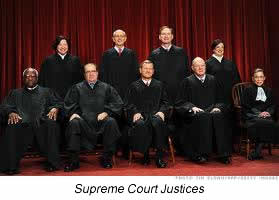
The Independent Voice for Conservative Values and the Conscience of the Conservative Movement Less Government is the Best Government |
||||
Supreme Court Rules on Illegal Immigration Law
Arizona Wins Partial Victory in a 5 to 3 Split Decision on SB 1070
Analysis by Scott Rohter, June 2012
 Governor Jan Brewer of Arizona called the recent Supreme Court decision on Arizona’s tough illegal immigration law SB 1070, “a victory for all Americans.” The central part of the law was upheld in an 8 to 0 decision Tuesday. Justice Elena Kagan recused herself from all votes regarding the Arizona law. The reason she gave for recusing herself was that she had been the Solicitor General when the Federal Government first sued Arizona over this matter. All of the other Liberal Justices on the Court voted with the conservative members to uphold the most important aspect of the Arizona law, however the victory was neither unqualified nor complete. There is still much more work that needs to be done. There were three other parts of the Arizona law that the Court ruled on and decided against Arizona on.
Governor Jan Brewer of Arizona called the recent Supreme Court decision on Arizona’s tough illegal immigration law SB 1070, “a victory for all Americans.” The central part of the law was upheld in an 8 to 0 decision Tuesday. Justice Elena Kagan recused herself from all votes regarding the Arizona law. The reason she gave for recusing herself was that she had been the Solicitor General when the Federal Government first sued Arizona over this matter. All of the other Liberal Justices on the Court voted with the conservative members to uphold the most important aspect of the Arizona law, however the victory was neither unqualified nor complete. There is still much more work that needs to be done. There were three other parts of the Arizona law that the Court ruled on and decided against Arizona on. In a 5 to 3 split decision with only Justices Scalia, Thomas, and Alito dissenting, certain other aspects of Arizona's get tough on illegal immigration law were rejected including the part that allowed for warrantless arrests when there is reason to believe that a person illegally in the country has committed a crime or misdemeanor. That was Section 6 of the Arizona law. Chief Justice John Roberts joined Justices Kennedy, Breyer, Ginsburg, and Sotomayor to reject that part of the Arizona law.
In a 5 to 3 split decision with only Justices Scalia, Thomas, and Alito dissenting, certain other aspects of Arizona's get tough on illegal immigration law were rejected including the part that allowed for warrantless arrests when there is reason to believe that a person illegally in the country has committed a crime or misdemeanor. That was Section 6 of the Arizona law. Chief Justice John Roberts joined Justices Kennedy, Breyer, Ginsburg, and Sotomayor to reject that part of the Arizona law. Another aspect of the law that was rejected by the same 5 to 3 margin with the same Justices aligning themselves on the same sides of the issue again was found in Section 5 of the Arizona law. This section made it a separate State crime for illegal aliens to work, or to apply for work, or solicit to do work while in Arizona. Again Chief Justice Roberts joined the liberal Justices of the Court: Kennedy, Ginsburg, Breyer, and Sotomayor to strike down that part of the Arizona law. They said that it interfered with Congressional jurisdiction which was delegated by the Constitution to Congress, and specifically to the Immigration Reform and Control Act of 1986 which did not make it a crime for illegal aliens to work in the country. Again Justices Scalia, Thomas, and Alito were dissenting.

Finally in a 6 to 2 split decision the Supreme Court ruled to strike down Section 3 of the Arizona law, which made it a separate crime for resident aliens not to carry registration papers with them to prove their legal status. On this aspect of the Arizona law, Justice Samuel Alito joined Chief Justice John Roberts and the Liberal Justices of the Court, Kennedy, Breyer, Ginsburg, and Sotomayor to reject that part of the Arizona law. Scalia and Thomas where dissenting.
In other words the victory we achieved today was a narrowly focused victory, and it was rather limited in scope. It was more of a moral victory than a practical victory, and there is still plenty of work to be done, and room for appeals and further legal wrangling… The wheels of justice turn slowly! Fox new analyst Judge Andrew Napolitano predicted almost immediately after the decision was announced that other aspects of the Arizona law including its implementation, as well as the unanswered questions raised by this Supreme Court Decision will be back at the Supreme Court being challenged within the next two years. This is about all we can expect from such a divided Supreme Court, with only three solid conservatives along with two moderates and four staunch liberal-progressives on the Bench. The type of rulings that this court hands down are not going to be either sweeping or far-reaching in nature. If Americans want to see real sweeping decisions that restore the proper balance of power between the States and the Federal Government, sweeping decisions which cut the power and authority of the Federal Government and restore the original precepts of Federalism and States Rights, and decisions which respect the 9th and 10th Amendments, then we will almost certainly have to do it ourselves at the ballot box by refusing to elect any more Democrat Presidents until the Democratic Party loses its zeal for progressive ideas!
 The other provisions of Arizona’s tough illegal immigration law that were either rejected by this Court or returned to the 9th Circuit Court of Appeals for further review include the central contention of the law that if the Federal Government fails to do its Constitutional duty by not enforcing existing immigration laws, that the States can step in and do it for them. That aspect of Federalism and that aspect of SB1070 were rejected by this Court all together. Other aspects of the Arizona law that were sent back down to the lower courts for further review and possible legal challenges include whether or not the law is being unfairly applied based upon racial profiling.
The other provisions of Arizona’s tough illegal immigration law that were either rejected by this Court or returned to the 9th Circuit Court of Appeals for further review include the central contention of the law that if the Federal Government fails to do its Constitutional duty by not enforcing existing immigration laws, that the States can step in and do it for them. That aspect of Federalism and that aspect of SB1070 were rejected by this Court all together. Other aspects of the Arizona law that were sent back down to the lower courts for further review and possible legal challenges include whether or not the law is being unfairly applied based upon racial profiling.But the central part of the law was upheld. In an 8 to 0 decision with Justice Elena Kagan recusing herself, the entire U.S. Supreme Court upheld the main thrust of the tough Arizona law. Their decision said it is okay for Arizona police to ask a person being detained for another reason, to see their proof of legal residency. All of the liberal Justices on the Court except Kagan who recused herself agreed with this aspect of the ruling, even Justice Sotomayor!
Let me repeat… If a person is already being detained, or stopped and being questioned for some other reason, then Arizona police can ask them for proof of legal residency. There is no question about this anymore! What Arizona police cannot do is they cannot just go around willy-nilly and pull people off the street for no other reason than to ask to see their “papers”, or randomly go up to people on the street and question them about some alleged crime that really didn’t occur, as a ruse just to see their papers! Of course how you prove whether or not they are actually doing that is why there is in all likelihood the real probability that Arizona’s law will be challenged again soon in the future. So Arizona will have to be very careful to strictly document every stop, and everything surrounding their attempts to enforce legal immigration. And of course when Arizona is done documenting everything, dotting all their I’s and crossing all their T’s, the Obama administration has made it perfectly clear that they do not intend to ever seriously deport any illegal aliens back to Mexico! So Arizona will just have to detain them in County jails until such time as we have a change in administrations and a change in policies at the Federal level.
 The Supreme Court said that cops cannot just go up to people on the street and ask to see their papers. That seems perfectly reasonable to me! We shouldn’t have to carry papers with us to prove our legal residency, other than perhaps a valid State driver’s license or identification card. And that driver’s license or identification card should only be issued to legal residents by the State Department of Motor Vehicles in every State! This is a decision that every State needs to make. We do not want to have a National I.D. Card. That would only mean even more Federal control over our lives. The implementation of this requirement that driver's licenses only be issued to legal residents is properly left up to the States under the provisions of the 9th and 10th Amendments.
The Supreme Court said that cops cannot just go up to people on the street and ask to see their papers. That seems perfectly reasonable to me! We shouldn’t have to carry papers with us to prove our legal residency, other than perhaps a valid State driver’s license or identification card. And that driver’s license or identification card should only be issued to legal residents by the State Department of Motor Vehicles in every State! This is a decision that every State needs to make. We do not want to have a National I.D. Card. That would only mean even more Federal control over our lives. The implementation of this requirement that driver's licenses only be issued to legal residents is properly left up to the States under the provisions of the 9th and 10th Amendments.As to how the person being detained for questioning by the police will be handled if they don’t have a valid driver’s license with them, and they don’t have any other immediate proof of legal residency at the time they are being questioned, I don’t actually know how the Arizona police will be handling those critical details, but I am sure that the Hispanic lobby will be closely monitoring the situation.
Justices Scalia, Thomas, and Alito were generally in the minority, and they agreed with each other on every aspect of this historic decision except one. Samuel Alito sided with the more liberal members of the Court when it came to not requiring resident aliens to carry their papers with them at all times. But generally speaking, Justices Scalia, Thomas, and Alito wanted to re-establish stronger State enforcement powers to enforce existing Federal Laws whenever the United States Government, because of a poor administration fails to do so. They wanted the States to be able to take over the role of the Federal Government in those rare cases when the Federal Government is derelict in its duties. This contention of the Arizona Law was rejected by the other members of the Supreme Court. A more vigorous and accurate interpretation of the 9th and 10th Amendments will have to await a more faithful and fundamentalist Supreme Court, and the people can only provide that at the ballot box by electing solid conservative Presidents and more conservative members of Congress. That is essentially what the Supreme Court said. This issue has to be decided at the ballot box in the next General Election!
Original source for breakdown of the Supreme Court decision http://www.azcentral.com/news/politics/articles/2012/06/25/20120625arizona-immigration-law-ruling-breakdown.html
"The truth, the political truth, and nothing but the political truth. A journalist has no better friend than the truth." - Scott Rohter |
 |
Home Page
Select Related Articles
Colonizing, 21st Century Style - Illegal Immigration from Mexico
Illegal Immigration and Legal Immigration
Victims of Success-Who is to Blame for America’s Downfall?
The Dream Act: A Real Nightmare
Immigration - Illegal and Legal - Audio
An Open Border
Victory in Virginia – Winning One for Limited Government
Prevailing in Pensacola - Florida Sues Federal Government Over Obama Care
Colonizing, 21st Century Style - Illegal Immigration from Mexico
Illegal Immigration and Legal Immigration
Victims of Success-Who is to Blame for America’s Downfall?
The Dream Act: A Real Nightmare
Immigration - Illegal and Legal - Audio
An Open Border
Victory in Virginia – Winning One for Limited Government
Prevailing in Pensacola - Florida Sues Federal Government Over Obama Care
© Scott Rohter, Less Gov is the Best Gov .com. All rights reserved.